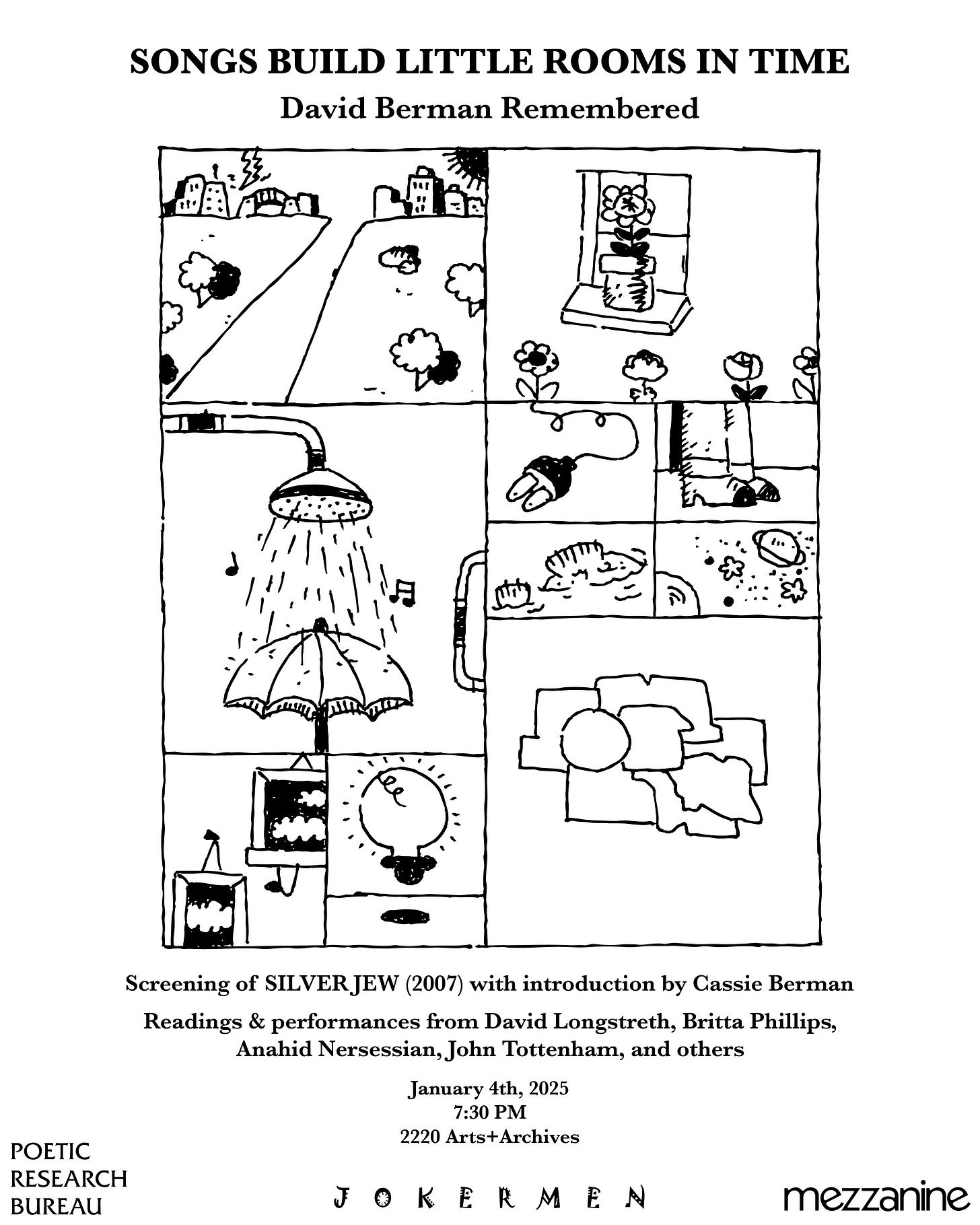What Is Not But Could Be If
My introduction of SILVER JEW (2007) from our recent David Berman event

On January 4th, 2025, Jokermen hosted Songs Build Little Rooms In Time, an event commemorating David Cloud Berman. It was a beautiful evening full of love and light, with performances and readings from contributors such as David Longstreth, Anahid Nersessian, and Britta Phillips. It also featured a presentation of the little-seen documentary SILVER JEW, which follows David and his bandmates as they tour Tel Aviv and Jerusalem in the summer of 2006.
SILVER JEW is an essential document of David Berman at an artistic and spiritual high point. At the same time, the film presents a simplified, one-sided view of modern Israel, which necessitated a brief introduction prior to the screening. I’m sharing the remarks I delivered here in full today—the day the Israeli state agreed to a cessation of their ongoing genocide of the Palestinian people.
In November 2003, David Berman tried to take his own life. Thankfully, for himself and those who loved him and everyone in this room, he failed. In the following months and years, he looked to his faith as a solution, a source of strength that he could turn to in place of substance abuse and alienation.
In the following years, David was looking for direction in his life, but more than that he was looking for connection. “I've always reserved a space for myself where I'm unattached to any group,” he said in an interview in 2005, “but the part of Judaism that I really take away, that means something to me, is the part about community.”
And that, first and foremost, is what this film is about. SILVER JEW is a document of a man who had lived his life in monk-like isolation discovering that there was a whole world out there—a community, to use his word—and that it was full of love for him and his art. Clearly, it still is full of love, as we can see here tonight.
And so it’s important to understand going into it that this is a personal film. At the same time, we’re screening it here tonight in the midst of very particular political circumstances, as the genocide of the Palestinian people by the Israeli state stretches into its third calendar year, with no end in sight. And so we can’t help but read the film with those circumstances in mind. To pretend otherwise is, quite simply, to lie.
And so I want to acknowledge in advance that there will be elements of this film that strike a sour note for some of us here tonight. They strike a sour note for me. There’s no way around it. SILVER JEW presents a simplified, one-sided view of the Israeli state—one that was as inaccurate in 2006, when it was filmed, as it is in 2025.
But at the same time, I want to emphasize that this is not a film about colonialism, apartheid, or any of the other very real horrors the Palestinian people contend with on a day-to-day basis. It is a film about David Berman, a man who named his band “Silver Jews” as a way of punishing himself—his words, not mine, as you’ll see momentarily—and who found, in Judaism, “a ticket out of his hellhole life.”
And so I ask all of us here tonight to acknowledge the imperfections and elisions and falsehoods within this film, and not to look past them or allow them a more charitable reading than they deserve. And at the same time, I ask us all to focus on the man at the film’s center, and in whose memory we’re gathered.
Because when I look at David, I see a human being profoundly different from those who lay claim to his faith while committing atrocities. I see a man from the American South wandering around millennia-old cities wearing a Western shirt and a trucker cap and shit-eating grin, cracking jokes like they’re going out of style. I see a kind, quiet soul searching for something, and maybe even finding it, momentarily, in the faces at his feet in the crowd singing his own words back to him. Even as I see the reality of a nation-state built on violence, subjugation, and misery, I see in David Berman the ideals of humility and humor and mercy that are so central to Judaism.
I see, to quote the man himself, what is not, but could be, if.



Beautifully written Ian. Thank you for reminding us to engage with the nuances and flaws of artists instead of hero worship or condemnation.